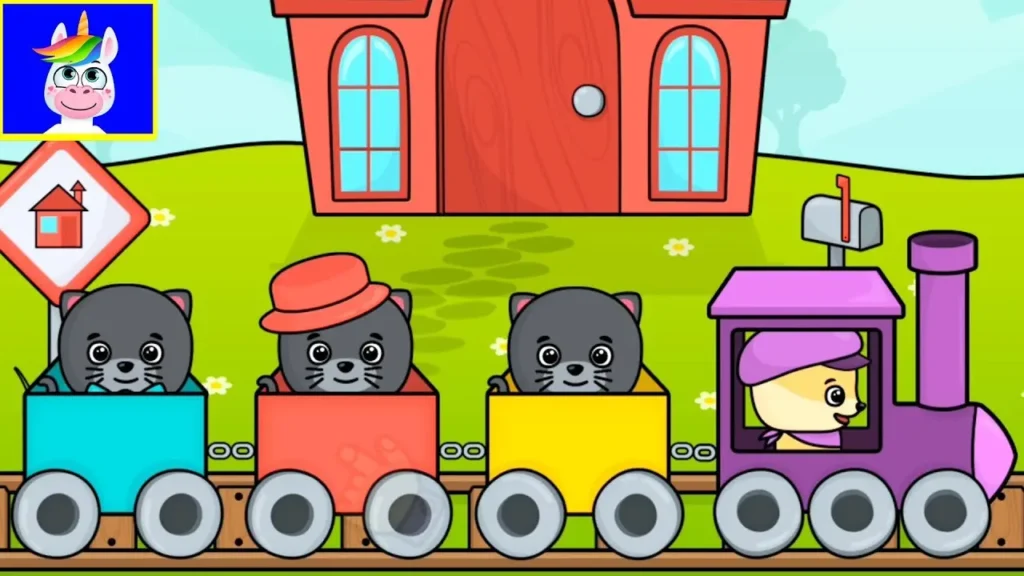Learning Games for Kids 2-5 YO
Brainytrainee Ltd
Apr 26, 2022
Feb 16, 2023
67.6 MB
1.0.3
Android 5.1+
Description
Overview of Learning Games for Kids 2-5 yo
Learning games for kids aged 2 to 5 years play a crucial role in early childhood development. These games are specifically designed to cater to the developmental needs of young children, providing a fun and engaging way to introduce basic concepts and skills. At this formative stage, children are rapidly acquiring language, cognitive abilities, and fine motor skills, making it an ideal time to introduce educational games.

These games often focus on fundamental areas such as basic mathematics, language development, problem-solving, and understanding the world around them. They are crafted to be age-appropriate, with vibrant colors, simple interfaces, and intuitive gameplay that captures the attention of young minds. Interactive elements like touch, drag, and voice commands are commonly used to enhance the learning experience.
Main Features of Learning Games for Kids 2-5 yo
Learning games for kids aged 2 to 5 years old are designed with several key features that cater to their developmental stage and learning needs:
- Educational Content: These games focus on basic educational concepts like numbers, letters, shapes, and colors. They introduce early math and literacy skills in a playful manner.
- Interactive Gameplay: Interaction is a core element, with games often using touch, drag, and simple gestures to engage young players. This interactivity not only makes the games more enjoyable but also helps develop fine motor skills and hand-eye coordination.
- Age-Appropriate Challenges: The challenges and tasks within these games are tailored to the cognitive level of young children. They are designed to be achievable and encouraging, ensuring that children feel a sense of accomplishment.
- Colorful and Engaging Graphics: Bright colors and appealing characters are used to capture the attention of young children. These visually stimulating elements make the learning process more enjoyable.
- Audio and Music: Many games incorporate playful sounds, music, and voice instructions, which are crucial for children who are not yet able to read. These auditory elements can aid in the development of listening skills and phonetic awareness.
- Parental Controls and Safety: Given the young age of the users, these games often come with parental controls and safety features to ensure a secure and appropriate learning environment.
- Adaptive Learning: Some games adapt to a child’s learning pace, offering more advanced challenges as they master certain skills. This personalized approach helps maintain the child’s interest and encourages continuous learning.
- Storytelling and Themes: Many of these games use storytelling or thematic approaches to teach concepts, making learning more relatable and engaging for young minds.
- Social and Emotional Learning: Besides cognitive skills, these games often include elements that promote social and emotional development, such as sharing, cooperation, and understanding emotions.
- Rewards and Motivation: To keep children engaged, games frequently include rewards systems, like badges, stars, or progress trackers. These rewards provide positive reinforcement and motivate children to continue learning.
How to Use Learning Games for Kids 2-5 yo?
- Download and Install: Start by downloading the Learning games for kids 2-5 yo from the Apptofounder. Search for “Learning games for kids 2-5 yo” to get notoriety. Launch the game on your device.
- Choose Age-Appropriate Games: Select games that are specifically designed for the 2-5 age group. Look for games that focus on basic skills like counting, colors, shapes, and simple problem-solving.
- Introduce the Game Gradually: Start by showing the child how the game works. Play alongside them initially to guide them through the basics of the game.
- Create a Routine: Set aside a specific time for playing educational games. Consistency helps children to learn better and gives them something to look forward to.
- Limit Screen Time: Even though these games are educational, it’s important to limit screen time according to the child’s age and developmental needs. Balance gaming time with other activities like outdoor play, reading, and creative activities.
- Interactive Play: Engage with the child while they play. Ask questions about the game, encourage them to explain what they are doing, and celebrate their achievements. This not only enhances learning but also strengthens the bond between the child and the adult.
- Monitor and Adjust: Observe how the child interacts with the game. If they find it too challenging or too easy, adjust the difficulty level or try a different game that better suits their current skills and interests.
- Encourage Independence: As the child becomes more familiar with the game, encourage them to play independently. This fosters self-confidence and decision-making skills.
- Balance with Other Learning Activities: Complement digital learning with non-digital educational activities. This can include reading books, hands-on crafts, and outdoor exploration.
- Ensure a Safe Environment: Use parental controls to ensure the content is appropriate and to manage in-app purchases or advertisements, if applicable.
- Review Progress: Many educational games for children have tracking or reporting features. Use these to review the child’s progress and understand their learning patterns.
Final Words of Learning Games for Kids 2-5 yo
In conclusion, learning games for kids aged 2 to 5 years play an invaluable role in early childhood development. These games blend fun with education, providing a foundation for basic academic skills in a way that is engaging and appropriate for young learners. They offer interactive experiences that foster cognitive growth, fine motor skills, language development, and problem-solving abilities.
While these digital games are a powerful tool in the modern educational landscape, it’s important to balance their use with a variety of other learning methods. Incorporating activities like outdoor play, interactive books, arts and crafts, and hands-on educational toys ensures a well-rounded developmental experience.
Parental involvement and supervision are key in maximizing the benefits of these games. By choosing appropriate games, setting limits on screen time, and engaging with children during play, parents and educators can guide children through a safe, enjoyable, and enriching learning journey.
As we embrace the digital age, it’s crucial to remember that the essence of early childhood education lies in exploration, curiosity, and play. Learning games for kids is a part of this journey, complementing traditional learning methods and paving the way for a lifelong love of learning.
Frequently Asked Questions (FAQs)
What skills can my child develop through these learning games?
Learning games for young children are designed to develop a variety of skills including basic math (like counting and recognition of numbers), language skills (such as vocabulary and basic grammar), problem-solving abilities, fine motor skills, and early literacy skills. They also aid in developing cognitive skills like memory and concentration.
How much screen time is appropriate for kids aged 2 to 5 when playing these games?
Children between the ages of 2 to 5 should only spend an hour a day on screens, according to the American Academy of Pediatrics. It’s important to ensure that this screen time is high-quality and interactive, preferably involving parental participation.
Are these games a replacement for traditional learning methods?
No, these games are not meant to replace traditional learning methods but rather to complement them. Activities like reading, storytelling, hands-on play, and interpersonal interaction are crucial for well-rounded development.
How do I choose the right learning game for my child?
Look for games that are age-appropriate, focusing on developmental milestones typical for your child’s age. Consider games that align with your child’s interests and offer a good balance between education and entertainment. Reading reviews and checking for educational endorsements can also be helpful.
Can these games help children with special educational needs?
Many learning games are designed with inclusive education in mind and can be beneficial for children with special educational needs. They can offer customizable settings, different levels of difficulty, and multisensory engagement, making them adaptable to various learning styles and needs. However, it’s important to choose games specifically suited to your child’s unique requirements and consult with education professionals if needed.






